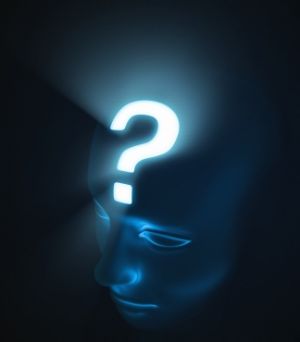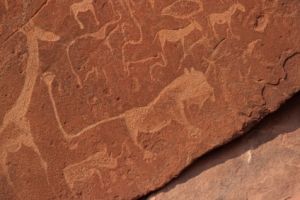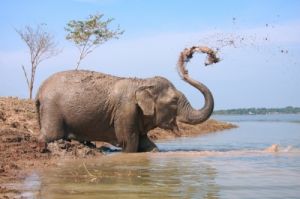Evolution of the Human Mind (Understanding Ourselves)

Many conflicts between countries, cultures, and individuals occur because we have different belief systems and ideas of right and wrong. Unlike animals though, how is it that human beings seem to have so many different beliefs and interpretations of the world? We have hundreds of religions, we discriminate in unlimited ways, and we have so many perceptions of what is right and wrong. Our diverse beliefs increase the probability of conflict between us and make it more difficult for us to work together. Quite clearly, human beings demonstrate more complex belief systems than animals, as shown by our many religious beliefs. Let's now look at how the belief systems of human beings are different from those of animals. If we can better understand how we are different, we may be able to reduce conflicts that result from our diverse belief systems.
Abstract thought and our ability to reason
The physical world is the world where we live in the now, with no thoughts of the future or the past. It is the world of matter and energy that we reach out and touch. When I think of the physical world, I imagine a creature in the moment, like a bird singing in the forest or a rabbit eating grass in a meadow. It is the world that we feel when we dive into the ocean and are revived by the tingling sensation of cold water on our bodies. In that moment, when we plunge into the water, if we had concerns in our mind of the past or future, they are erased for a moment of immediate sensation. It is the world of "now".
Instead of the physical world, imagine the world of abstract thought. The world of abstract thought brings to mind words like: conceive, imagine, hypothesize, postulate, extrapolate, theorize, interpolate, and even dream. To me, all these words describe the world that we create beyond the physical world of matter and energy. Our world of abstract thought allows us to conceive what might be beyond the physical world. Abstract thought is like a map in our minds, with all our beliefs as the different locations. We actually exist in the "now", our current location, but our beliefs are all the possible places we imagine might have been, or will be. There is no certainty about whether these places actually existed or will exist in the physical world, nor whether we will ever be able to visit them.
Our ability for abstract thought allows us to see beyond the "now" - the present moment. In so doing, we can reason between what we believe was before, what is now, or what we believe might come to be. We experience the concept of time in order to connect our thoughts of the past, present, and future. It is the world of abstract thought for which we create probabilities of the things we believe might be, come to be, or even what we believe may have been. For example, one may ask oneself "What is the probability that I will have a good business meeting tomorrow?" Abstract thought allows us to reason, be intelligent, and create our technologies. It allows us to conceive what might come to be, which in some cases is accurate, but in many other cases is far from what actually occurs. How did we gain the ability of abstract thought that seems to set us apart from most other creatures?
Here is one possible answer. As humans evolved, it was absolutely essential to "conceive" the relationships between matter and energy so that we could manipulate our environment thereby creating our complex technologies. We learned to "conceive", "imagine", and to "simulate" ideas, before actually implementing them. This is not so different from the example discussed of the chimp finding a stick to eat termites. Imagine a caveman being able to conceive the creation of a spear even before making it. In realizing something sharp at the end of the stick was useful in hunting, the caveman may have conceived of combining a stick with a piece of sharp flint. Then he conceived that he could tie them together with some sinew from an animal thus creating a spear. He may then have imagined a device to hurl the spear which may have led to the bow and arrow.
My suggestion is, that our minds became able to recall our experiences and concepts from memory, combine them, and allow us to imagine the infinite possibilities that might come from combining them. This became the human mapping system we call intelligence. It has become a part of all of us. It allows us to remember the past, connect it to the present, and extrapolate to the future in order to create technologies, and of course, an unlimited number of belief systems. It may even be what allows us to experience the concept of time as part of our mapping system. After all, at the very moment when you run into the waves in the ocean, do you really think of "time ? I think probably not.
As we continued to evolve, we came to see the world through different eyes than do other animals. It was as if simpler creatures lived in the moment, looking at the world two-dimensionally, where one simple action just led to another. As we evolved though, not only could we see the space in front of us like other animals as we moved through our world, but we came to see a type of depth - almost another dimension. That depth was the multitude of possible scenarios that we could imagine might be in the future. For example, a simpler animal might just go to the river each day to drink, but we might go there imagining first what it would be like if it was raining out, or if it was sunny, or if our friends were down at the river as well. We could even envision, project, extrapolate, or conceive, what it might be down at the river in a day from now, or a week, or a month. We began to be able to conceptualize our possible situations beyond just experiencing them in the moment. We learned to give probability estimates to what we conceived might be. In a sense, we were able to extrapolate and map out the world around us in our minds without actually physically experiencing it. As we developed our ability to conceptualize different possible future scenarios, we applied the concept of "time" to organize our abstract thoughts. For example, scenario 1 might occur in a day from now, scenario 2 in 2 days, and so on. Unlike simpler creatures, we even began to imagine scenarios of what might happen after we die. We were now able to live beyond the moment. In our minds we could extrapolate infinite situations and possibilities by combining and connecting all our past experiences and memories.

Our ability for abstract thought has allowed us to do amazing things. An artist can imagine a beautiful landscape and then transfer their conceptualization from their mind to a painting for everyone to see. An engineer can design a building on paper and even use "science" to determine what materials to use and how thick they need to be in order to ensure the greatest strength for the building, even before starting construction. Going further, the early cavemen would draw images of bison on cave walls, their sun gods, or any images with meaning that they could conceive. This may have been the beginning of extending their imagination to new unlimited places.
As human beings, we can conceive of just about anything. I can, for example, imagine that there is a planet like Earth just outside of our solar system that no one has found. It is populated with dinosaurs and it is much like the Earth was when the dinosaurs existed. I can "conceptualize" this and you can interpret my idea and decide if you will agree or not. If a scientist agrees with me, then you might be more prone to agree. If 90% of the world agrees, you might think it even more probable. Going further, if someone you respect and trust who always seems to be right tells you this, it might seem more probable to the point that you might label it as "true".
If I can so easily imagine the dinosaur idea mentioned above, and put it forth to anyone, it comes as no surprise that we as human beings are exposed to, and must interpret and decipher, a virtually infinite number of "conceptions" in our lives. In addition, we ourselves can create a virtually infinite number of "conceptions". As we create these abstract thoughts our imaginations can run off and allow us to reach places in our mind that no other animal can go. Like a child reading a fairy tale, we can find great comfort and peace in our conceptions, but at the same time our ability to conceive of an idea can cause us to create inaccurate beliefs, thereby causing us to get into trouble in ways that animals do not.
For example, I have never heard of two lions fighting over what they imagined the next world might look like after they die. Yes, they fight over their mates, over their offspring, and for resources like food and shelter, but I have not heard of them fighting over such things as their religious beliefs. For example, one individual may believe their image of life after death is completely different than that of another individual. This can lead to conflict that would not be found in other animals. Such conflicts over religious beliefs often occur between countries and cultures. Regardless of whether a specific belief is true or not, I believe as human beings, we need to observe that our unique ability of abstract thought, leading to our diverse beliefs, may often lead to unnecessary conflicts. This is especially the case now, given that social media and the internet have exposed us all to a virtually infinite array of beliefs and ideas, often supported with no substantive facts. In a sense, one might consider this new exposure to what is often termed as "fake news", a side effect of our technology.
As a result of our ability to reason and conceptualize, we imagine infinite relationships between objects and events around us for which we cannot help but create an overwhelming need for answers. What lies ahead in our future? Why am I here? Why is the sky blue? The point I want to make is that, unlike simpler animals, we create an endless number of questions for ourselves and we end up needing answers to these complex questions. Hence, we are very vulnerable to accepting inaccurate assumptions and misleading beliefs from those who might claim to have the answers to our questions. Often their intent may only be that they are looking for power and control. For example, consider the Jim Jones Massacre where followers of his beliefs became a part of a mass suicide. This is an extreme example, but it shows how we might sacrifice our existence in our physical world, for beliefs that are impressed upon us of what might seem a better world than the one in which we exist. Any belief system that might lead us to conceive that there is a better world whereby we might sacrifice our existence in the physical world in which we live can be detrimental to survival.

In conclusion, our unique ability to "conceptualize" can leave us vulnerable to beliefs that might cause conflict between us. This in turn can cause us to harm each other, the Earth, and ourselves. Only we can choose which beliefs we wish to live by. With respect to our ideologies, I hope we recognize that our unique evolved ability to think abstractly may be part of the cause for human beings having such diverse beliefs which in turn lead to unnecessary conflicts that have become much more dangerous.
Our ability to conceive ideas of the past
I have talked a lot about how human beings can "conceive" diverse beliefs, leaving them open to conflicts rarely found with animals. It also seems that human beings find more conflict through their inability to forget the past. Our enhanced capability of memory, compared to other animals, has also increased the probability of conflict between us. For example, if two sea lions fight over a space in the rocks, in a few moments their dispute is over and they accept their new positions. With human beings though, when we lose things that we value in conflicts, we often "remember" the dispute and continue to fight for months, years, decades, or even centuries later. I should also qualify this point by noting that our agreements over the past can also prevent us from having unnecessary conflicts as well.
An example of a current day dispute is the Israeli Palestinian conflict which has gone on for over 100 years. I cannot comment on the nature of the conflict, but I think it is fair to observe that animals would probably not have carried on so long. This is simply because they would have forgotten the reasons behind the disagreement, and accepted the territories they ended up with. Hopefully all parties involved can continue to persevere at resolving their differences by reexamining the reasons behind them. Is it possible that a lot of discrimination and anger over which many conflicts occur between countries, is simply due to some of the unique ways that we are different from other creatures? Can we separate the discrimination and hate that can grow over generations that fuels many current day conflicts, from the real immediate reasons for conflicts? Can we then see each other all as human beings and attempt to work together over the territories or resources being disputed, and find a way to apportion them to everyone's benefit, regardless of the past? This is especially important given the presence of our new technologies like nuclear weapons that have a greater impact on the world.
I find it interesting how in North America for example, before the Europeans came, the Native Indians inhabited the land. Essentially, North America was invaded and ownership was transferred, but the original inhabitants may never forget how the territory was taken from them. Animals would long have forgotten. For example, a buffalo that still might roam the plains in North America, would have no memory of the past which might otherwise cause it to feel remorse against the fact that its species was virtually made extinct due to the new residents of its territory.
Regarding the ability of human beings to conceive the past, I am suggesting that they not only are more vulnerable to having conflicts because of their diverse beliefs, but also because they continue to fight for the "way it was". This makes it extremely difficult to "forgive and forget".
Our inherent need to question the world around us

Imagine that after hours of crossing the plains, an elephant arrives at the river. It immerses itself, cools its body, and quenches its thirst. That moment for the elephant involves no thought of the past or the future, just the pleasure of feeling the cool water on its body. The elephant is in the moment. Now imagine a tribesman who also comes down to the river. He too enjoys the same pleasure but he looks to the left into the hills from where the rich body of pleasure runs from. He cannot help but ask himself, "What is the source of the river"? He then looks to the right and asks himself "Where does this river flow to?" "Where does it end?" I doubt very much that the elephant stops to ponder these two questions. For the tribesman, it is his nature to ask such questions. The tribesman carries with him the quality of abstract thought - an inherent desire to create a mental map of the world around him.
Now imagine the river as life itself. Just as the tribesman asked himself from where the river flowed, he might also ask himself "Where am I from and how did I get here?" Likewise, just as he wondered where the river runs to as it leaves the valley, he might ask himself "Where am I going and what will happen to me after I am gone?" It seems that as part of our ability to think abstractly, we cannot help but seek answers to questions such as these. They are like a void within us that must be filled. Who am I? Where did I come from? Where am I going? What will happen to me after I am gone? I do not expect that the elephant would take the time to stop and ponder such questions in the same way.
It seems that our need to question and understand the world is part of our condition. This can leave us very vulnerable and open to accepting belief systems that may not be accurate representations of physical reality. Unlike simpler animals, this can increase the probability of conflict between us.
It all follows, that in our best interest to minimize conflict between us, individuals, cultures, and countries need to remain open minded regarding their beliefs, and try to be more tolerant of the beliefs of others when at all possible. Further, it is very important that the interpretations of reality that we choose, our beliefs, be accurate representations of the physical world. As the side effects of our technologies have a greater and greater impact, it will become a luxury to interpret the world inaccurately. In the past we may have been able to get away with inaccurate belief systems, but in the future, the cost of misinterpreting reality may be significantly greater.
As a simple example, if an asteroid were going to collide with a planet, a choice could be made as to whether to destroy it or not. Some, based on their religion, might believe that they will be saved from it, or, if they do perish they will go to a better place anyway. Hence, they might take no action to prevent the impact of the asteroid. Regardless of whether the beliefs of the religion are true or not, such an interpretation of reality would likely threaten their physical existence. One could imagine two planets in such a situation where one life form chose to react to the asteroid, and the other chose to ignore the consequences. In all likelihood, those on the planet that prepared for the asteroid would survive and endure in the physical reality they live in. Further, their "interpretation of reality" and their ideas of "right and wrong" that enabled them to make the choices to survive, would survive with them.
Summary on the evolution of the human mind
As human beings evolved, and we learned to manipulate matter and energy to create technologies to help us survive, we gained the ability of "abstract thought" and "reason". Though our intelligence and abstract thought enables us to benefit from the creation of complex technologies, they have also caused us to create infinite belief systems to interpret reality, often in the form of religions. Whether they are true or not, we have become vulnerable to conflict over these different interpretations of the world. We can fight over diverse beliefs, we can fight over the past as we remember it, and we can fight over the future as we think it might come to be.
I think the lesson for humanity is that because we have evolved to have such diverse beliefs (e.g. religions, ego, and discrimination), we must accept that even with its benefits, our diverse beliefs can also be seen as a possible flaw, making us more vulnerable to conflict than other animals. We must break free from our old habits of finding conflict over our beliefs and acknowledge this vulnerability. When we are about to fight or disagree, we need to ask ourselves, "Is the conflict we are facing one that we can put behind us?" When all seems lost, can we still ask ourselves, "Is there a way to resolve this problem without killing thousands of human beings and other life?" Can we learn to accept the past for the promise of a better future?
We can always look into the past at our wars that occurred over religion, discrimination, or conflicting belief systems, and say they do not matter. They do matter though, because they are the actions that define the world we live in. They set the precedents for the future. As our capacity to impact each other and the planet continues to grow through our technologies, our choices in handling conflicts will matter more. We must look upon ourselves objectively and recognize the unique characteristics in ourselves that cause unnecessary conflicts between us. We can then move on to making the choices that will be the best for the future of Life and Earth. As we make these choices, it will be more important than ever that they are based on accurate interpretations of reality, given that our technologies will have a greater and greater impact on the world.
